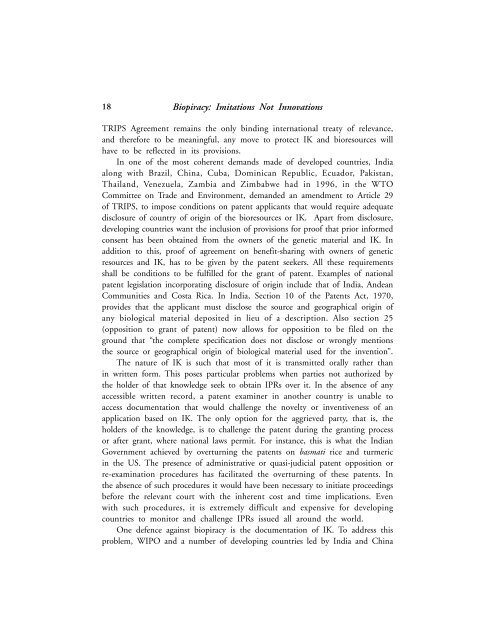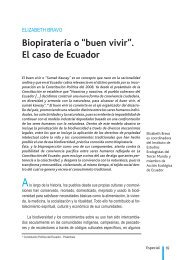BIOPIRACY Imitations Not Innovations - Biopirateria
BIOPIRACY Imitations Not Innovations - Biopirateria
BIOPIRACY Imitations Not Innovations - Biopirateria
Create successful ePaper yourself
Turn your PDF publications into a flip-book with our unique Google optimized e-Paper software.
18 Biopiracy: <strong>Imitations</strong> <strong>Not</strong> <strong>Innovations</strong><br />
TRIPS Agreement remains the only binding international treaty of relevance,<br />
and therefore to be meaningful, any move to protect IK and bioresources will<br />
have to be reflected in its provisions.<br />
In one of the most coherent demands made of developed countries, India<br />
along with Brazil, China, Cuba, Dominican Republic, Ecuador, Pakistan,<br />
Thailand, Venezuela, Zambia and Zimbabwe had in 1996, in the WTO<br />
Committee on Trade and Environment, demanded an amendment to Article 29<br />
of TRIPS, to impose conditions on patent applicants that would require adequate<br />
disclosure of country of origin of the bioresources or IK. Apart from disclosure,<br />
developing countries want the inclusion of provisions for proof that prior informed<br />
consent has been obtained from the owners of the genetic material and IK. In<br />
addition to this, proof of agreement on benefit-sharing with owners of genetic<br />
resources and IK, has to be given by the patent seekers. All these requirements<br />
shall be conditions to be fulfilled for the grant of patent. Examples of national<br />
patent legislation incorporating disclosure of origin include that of India, Andean<br />
Communities and Costa Rica. In India, Section 10 of the Patents Act, 1970,<br />
provides that the applicant must disclose the source and geographical origin of<br />
any biological material deposited in lieu of a description. Also section 25<br />
(opposition to grant of patent) now allows for opposition to be filed on the<br />
ground that “the complete specification does not disclose or wrongly mentions<br />
the source or geographical origin of biological material used for the invention”.<br />
The nature of IK is such that most of it is transmitted orally rather than<br />
in written form. This poses particular problems when parties not authorized by<br />
the holder of that knowledge seek to obtain IPRs over it. In the absence of any<br />
accessible written record, a patent examiner in another country is unable to<br />
access documentation that would challenge the novelty or inventiveness of an<br />
application based on IK. The only option for the aggrieved party, that is, the<br />
holders of the knowledge, is to challenge the patent during the granting process<br />
or after grant, where national laws permit. For instance, this is what the Indian<br />
Government achieved by overturning the patents on basmati rice and turmeric<br />
in the US. The presence of administrative or quasi-judicial patent opposition or<br />
re-examination procedures has facilitated the overturning of these patents. In<br />
the absence of such procedures it would have been necessary to initiate proceedings<br />
before the relevant court with the inherent cost and time implications. Even<br />
with such procedures, it is extremely difficult and expensive for developing<br />
countries to monitor and challenge IPRs issued all around the world.<br />
One defence against biopiracy is the documentation of IK. To address this<br />
problem, WIPO and a number of developing countries led by India and China



